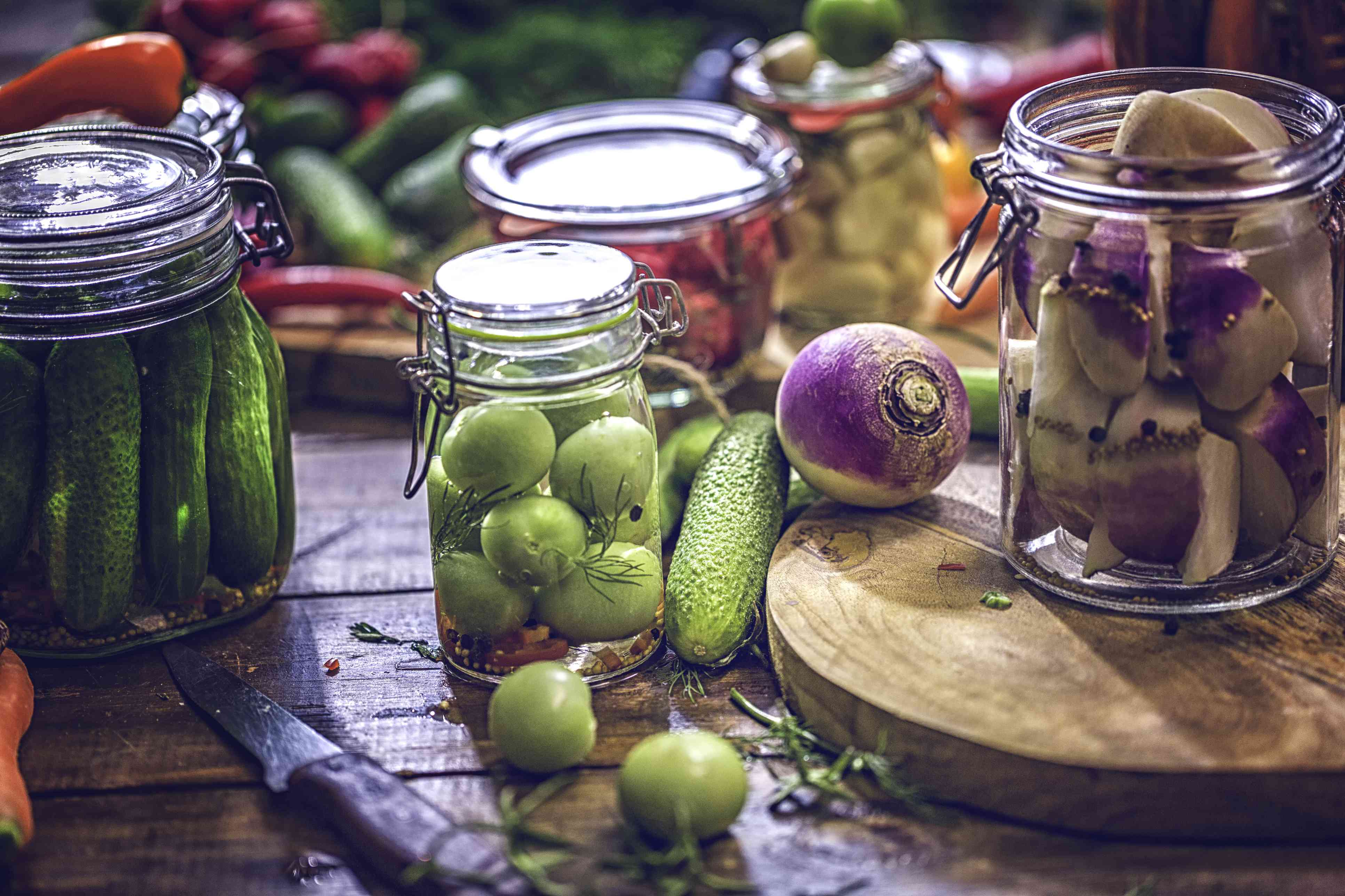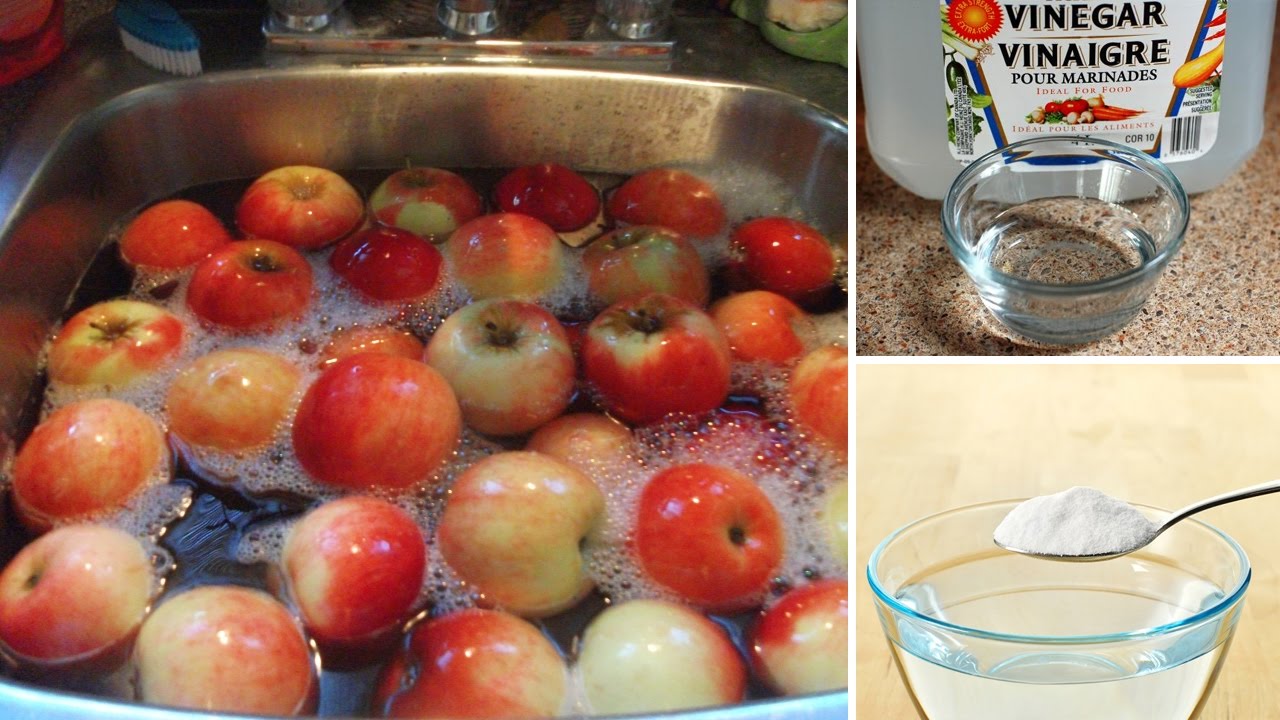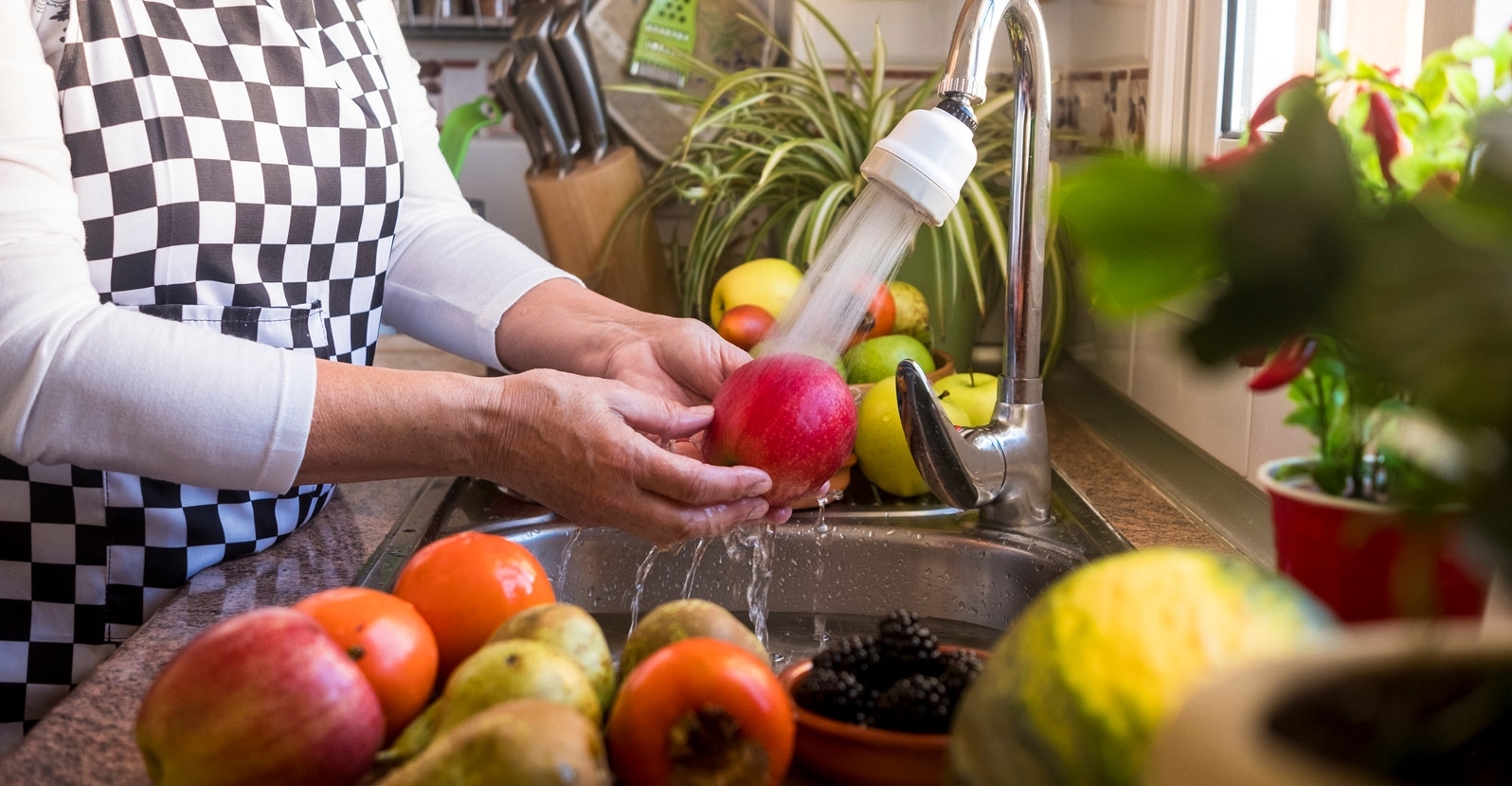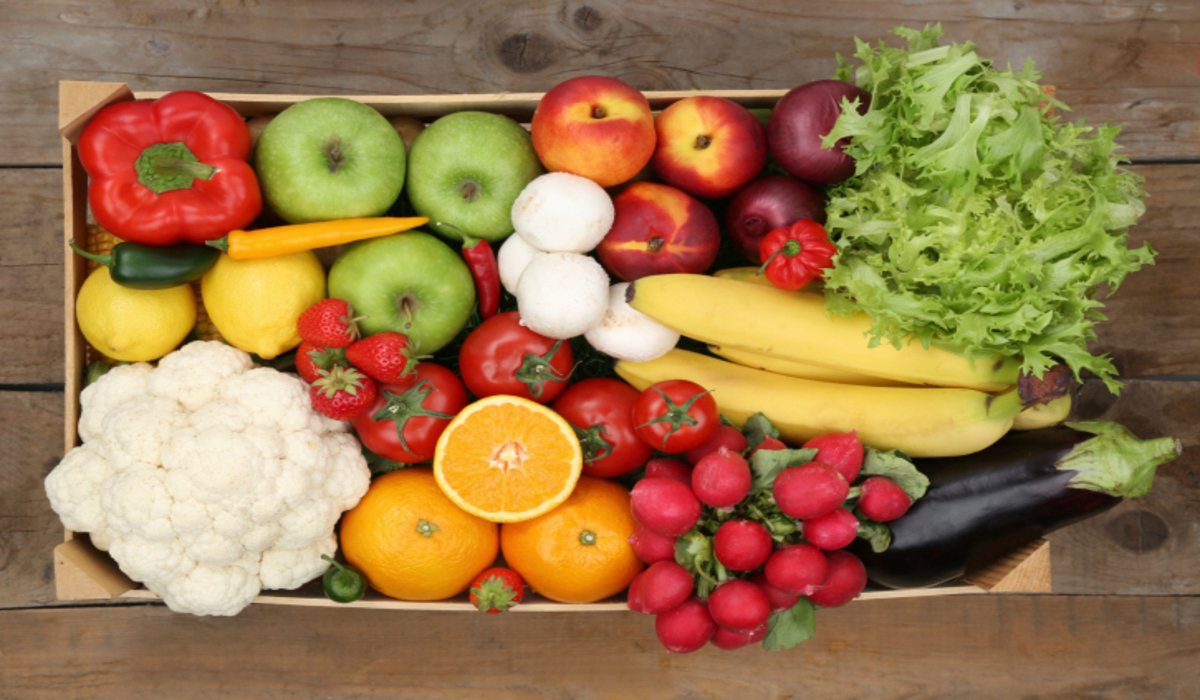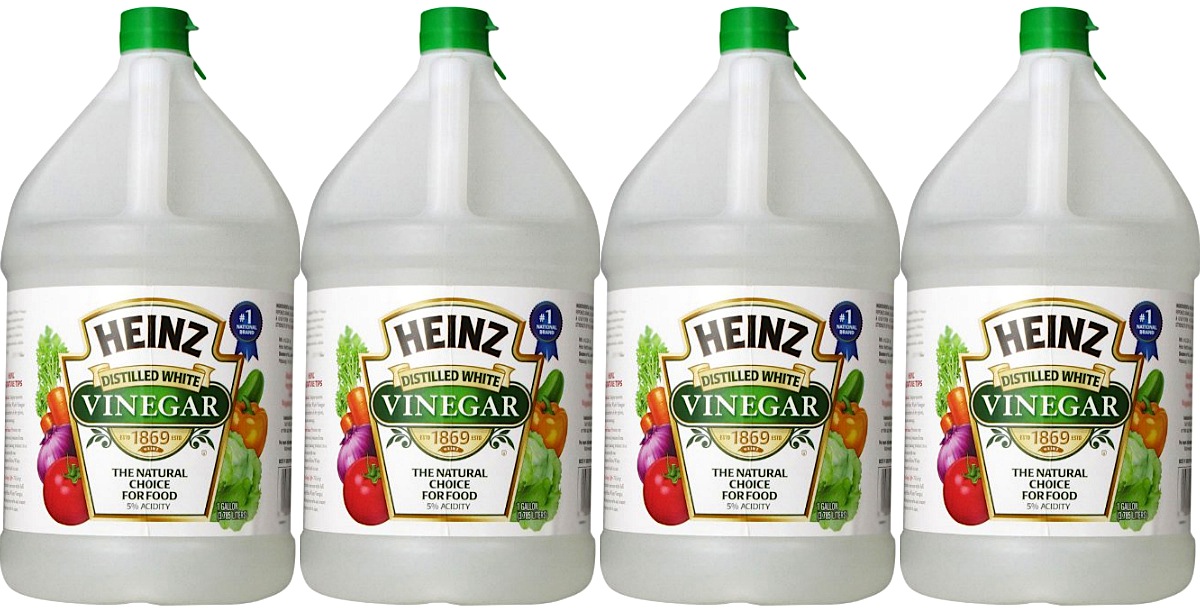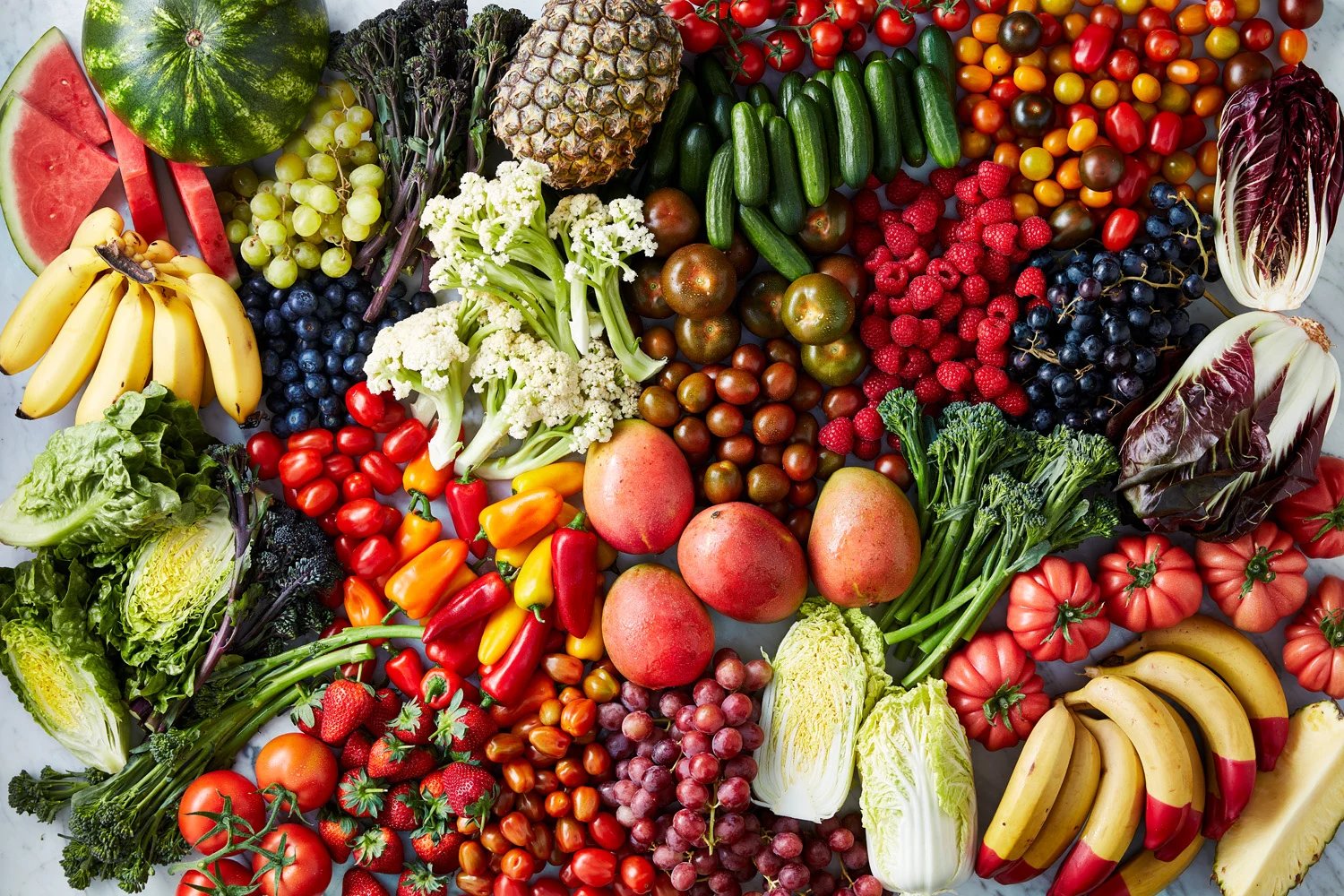Home>Types of Gardening>Edible Gardening>What Are The Healthiest Fruits And Vegetables
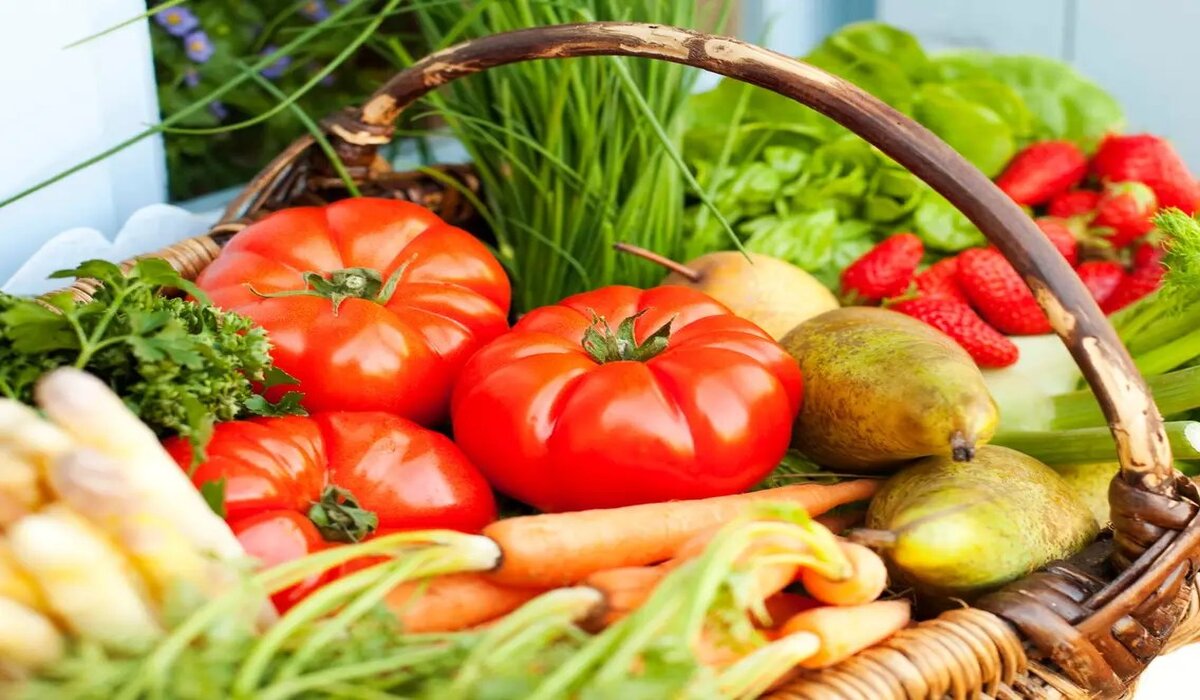

Edible Gardening
What Are The Healthiest Fruits And Vegetables
Modified: January 22, 2024
Discover the healthiest fruits and vegetables to grow in your edible garden. Boost your nutrition and enjoy a bountiful harvest with our expert gardening tips.
(Many of the links in this article redirect to a specific reviewed product. Your purchase of these products through affiliate links helps to generate commission for Chicagolandgardening.com, at no extra cost. Learn more)
Table of Contents
Introduction
Edible gardening is a growing trend among health-conscious individuals as it offers numerous benefits, from providing fresh, organic produce to promoting physical activity and relaxation. Whether you have a sprawling backyard or a small balcony, growing fruits and vegetables can be a rewarding experience.
Not only does edible gardening allow you to have control over what you consume, but it also gives you the opportunity to savor the flavors of homegrown fruits and vegetables, which are often richer and more delicious than store-bought alternatives. Additionally, by growing your own produce, you can reduce your carbon footprint, as you won’t be relying on long-distance transportation or harmful pesticides.
When it comes to choosing which fruits and vegetables to grow in your garden, it’s important to prioritize those that offer the most health benefits. While all fruits and vegetables are nutritious, certain varieties stand out for their exceptional nutritional content, high levels of antioxidants, and disease-fighting properties.
In this article, we will explore some of the healthiest fruits and vegetables you can grow in your garden. From leafy greens to vibrant berries, these nutrient-packed options will not only enhance the taste of your meals but also provide you with a wide range of essential vitamins, minerals, and antioxidants.
By incorporating these fruits and vegetables into your diet, you can support your overall health and well-being, boost your immune system, and reduce the risk of chronic diseases such as heart disease, diabetes, and certain types of cancer. Let’s dive in and discover the abundance of benefits that edible gardening can offer.
Benefits of Eating Fruits and Vegetables
Eating a diet rich in fruits and vegetables is essential for maintaining optimal health. These colorful and nutrient-dense foods provide a myriad of benefits that contribute to overall well-being. Here are some of the key advantages of incorporating fruits and vegetables into your daily diet:
- Nutrient Powerhouses: Fruits and vegetables are packed with essential vitamins, minerals, and dietary fiber that are crucial for the proper functioning of the body. They provide a wide array of nutrients such as vitamin C, vitamin A, potassium, folate, and antioxidants that support various bodily functions and promote optimal health.
- Disease Prevention: Regular consumption of fruits and vegetables has been linked to a reduced risk of chronic diseases. The high content of antioxidants in these foods helps combat oxidative stress and inflammation, which are underlying factors in conditions like heart disease, cancer, and neurodegenerative diseases.
- Weight Management: Fruits and vegetables are low in calories and high in dietary fiber, making them excellent choices for weight management. The fiber content helps promote feelings of fullness and aids in digestion, thus helping to control appetite and prevent overeating.
- Improves Digestive Health: The high fiber content in fruits and vegetables promotes a healthy digestive system by preventing constipation and supporting regular bowel movements. Additionally, certain fruits and vegetables, such as papaya and pineapple, contain digestive enzymes that aid in effective digestion.
- Healthy Skin: Many fruits and vegetables are rich in antioxidants and vitamins that promote healthy skin. These nutrients help protect against cellular damage, improve skin elasticity, and give you a radiant complexion.
- Boosts Immunity: Fruits and vegetables are abundant in immune-boosting vitamins, minerals, and antioxidants, which help strengthen the immune system and protect against infections and illnesses.
- Supports Heart Health: The high fiber, potassium, and antioxidants found in fruits and vegetables contribute to heart health by reducing blood pressure, managing cholesterol levels, and improving overall cardiovascular function.
With all these benefits as reasons, it’s evident that incorporating a variety of fruits and vegetables into your diet is essential for maintaining good health and overall well-being. So, let’s now explore some of the healthiest fruits and vegetables you can grow in your garden to further enhance the nutrient value of your meals.
Criteria for Determining the Healthiest Fruits and Vegetables
When determining the healthiest fruits and vegetables to grow in your garden, several factors come into play. These factors help determine the nutritional value, disease-fighting properties, and overall benefits of various plant-based foods. Here are the criteria commonly used to evaluate the healthiness of fruits and vegetables:
- Nutrient Density: Nutrient density refers to the concentration of essential vitamins, minerals, and antioxidants in a particular fruit or vegetable. The healthiest options are those that provide a wide range of nutrients in a compact form, offering the most nutritional bang for your buck.
- Antioxidant Content: Antioxidants are compounds that help protect the body from oxidative stress and cell damage caused by free radicals. Fruits and vegetables rich in antioxidants can help reduce the risk of chronic diseases such as heart disease, cancer, and neurodegenerative disorders.
- Fiber Content: Fiber is essential for a healthy digestive system, weight management, and maintaining stable blood sugar levels. Fruits and vegetables with high fiber content help promote satiety, regulate bowel movements, and support overall gut health.
- Low Calorie and Sugar Content: The healthiest fruits and vegetables are those that provide essential nutrients without adding excessive calories or sugar to your diet. These low-calorie options can help with weight management, blood sugar control, and overall metabolic health.
- Seasonality: Choosing fruits and vegetables that are in-season ensures optimal freshness and flavor. Seasonal produce is often picked at peak ripeness, maximizing its nutritional value and ensuring the best taste.
- Organic vs. Conventional: Opting for organic fruits and vegetables reduces exposure to harmful pesticides and chemicals. However, it’s important to note that conventionally grown produce can still provide significant health benefits and nutrients.
- Diversity: Consuming a diverse range of fruits and vegetables ensures a variety of nutrients and phytochemicals, which can have synergistic health benefits. Aim to include a colorful array of fruits and vegetables in your garden to experience a wide range of health-promoting compounds.
By considering these criteria, you can make informed choices when selecting the healthiest fruits and vegetables to grow in your garden. Now, let’s explore some specific examples of the healthiest fruits and vegetables that will enhance the nutrition of your meals and support your overall well-being.
Leafy Green Vegetables
Leafy green vegetables are nutritional powerhouses and a must-have in any edible garden. These vibrant greens offer an abundance of essential vitamins, minerals, and antioxidants that support overall health. Some of the healthiest leafy green vegetables to grow include:
- Spinach: Spinach is packed with iron, folate, and vitamins A and K. It is also rich in antioxidants that help protect against oxidative stress and inflammation in the body.
- Kale: Kale is known for its high levels of vitamins A, C, and K, along with minerals like calcium and magnesium. This leafy green also contains powerful antioxidants like lutein and zeaxanthin, which promote eye health.
- Swiss Chard: Swiss chard is an excellent source of vitamins A, C, and K, as well as magnesium and potassium. It also contains compounds called betalains, which have anti-inflammatory and antioxidant properties.
- Collard Greens: Collard greens are rich in vitamins A, C, and K, as well as calcium and fiber. They are also high in glucosinolates, compounds that may have anti-cancer effects.
Leafy green vegetables are low in calories and high in fiber, making them ideal for weight management and digestive health. They are also incredibly versatile and can be enjoyed in salads, stir-fries, smoothies, and more.
Not only do leafy green vegetables provide a host of essential nutrients, but they also offer a refreshing burst of flavor and a satisfying crunch. By incorporating these healthful greens into your diet, you can bolster your immune system, support proper digestion, and promote overall vitality.
With their impressive nutritional profiles, leafy green vegetables undoubtedly earn their place as some of the healthiest options to grow in your edible garden.
Berries
Berries are not only delicious but also packed with essential nutrients and antioxidants, making them a fantastic addition to any edible garden. These tiny yet powerful fruits offer a range of health benefits. Here are some of the healthiest berries to consider growing:
- Blueberries: Blueberries are renowned for their high antioxidant content, particularly anthocyanins, which have been linked to various health benefits. They are also a good source of vitamins C and K and provide fiber for digestive health.
- Strawberries: Strawberries are loaded with vitamin C and manganese and are a great source of dietary fiber. They also contain flavonoids, which have antioxidant and anti-inflammatory properties.
- Raspberries: Raspberries are rich in vitamin C, manganese, and fiber. They are also packed with antioxidants, such as ellagic acid, which may have anti-cancer properties.
- Blackberries: Blackberries are bursting with vitamins C and K, fiber, and antioxidants. They also contain anthocyanins, which help protect against chronic diseases and support brain health.
Not only are berries nutritious, but they are also low in calories and high in water content, making them an excellent choice for weight management and hydration. Their vibrant colors indicate high levels of antioxidants, which help protect against cellular damage and promote overall well-being.
Berries are incredibly versatile and can be enjoyed fresh, frozen, or added to a variety of dishes, including smoothies, salads, and desserts. Their natural sweetness makes them a healthier alternative to processed sugars, adding a burst of flavor to your meals.
By growing berries in your garden, you can enjoy the satisfaction of picking and consuming these exquisite fruits at their peak ripeness. The health benefits they provide, coupled with their delightful taste, make them a perfect addition to any edible garden.
Cruciferous Vegetables
Cruciferous vegetables are a group of nutrient-dense vegetables known for their distinct taste and impressive health benefits. These vegetables get their name from the cross-shaped pattern of their flowers. Rich in vitamins, minerals, and phytochemicals, cruciferous vegetables are a valuable addition to any edible garden. Here are some of the healthiest cruciferous vegetables to consider growing:
- Broccoli: Broccoli is packed with vitamins C, K, and A, as well as fiber, folate, and antioxidants. It also contains a compound called sulforaphane, which has been shown to have anti-cancer properties.
- Cauliflower: Cauliflower is a versatile vegetable that is high in vitamin C, vitamin K, and fiber. It is also a good source of antioxidants and contains compounds that may have anti-inflammatory and anti-cancer effects.
- Kale: Kale, mentioned earlier in the leafy green section, is a cruciferous vegetable. It is loaded with vitamins A, C, and K, along with minerals like calcium and magnesium. Kale is also rich in antioxidants that support overall health.
- Cabbage: Cabbage is low in calories and high in vitamins C, K, and B6, as well as fiber. It contains compounds called glucosinolates, which can be converted into cancer-fighting substances in the body.
Cruciferous vegetables are known for their potential health-promoting properties, including anti-inflammatory and anti-cancer effects. They are also rich in fiber, which supports digestive health, and provide an array of essential nutrients for overall well-being.
These versatile vegetables can be enjoyed in various ways, such as steamed, roasted, or added to stir-fries, salads, and soups. Incorporating cruciferous vegetables into your diet not only enhances the nutritional value of your meals but also contributes to long-term health.
By growing cruciferous vegetables in your garden, you can have a fresh supply of these nutritious and flavorful vegetables right at your fingertips. So, don’t miss the opportunity to experience the numerous health benefits offered by these remarkable plants.
Citrus Fruits
Citrus fruits are juicy, refreshing, and packed with essential nutrients, making them a delightful addition to any edible garden. These fruits are known for their tangy flavors and vibrant colors, but they also offer a host of health benefits. Here are some of the healthiest citrus fruits to consider growing:
- Oranges: Oranges are well-known for their high vitamin C content, which supports immune function and skin health. They are also a good source of dietary fiber and provide a range of antioxidants, including hesperidin.
- Grapefruits: Grapefruits are packed with immune-boosting vitamin C, fiber, and electrolytes. They also contain various antioxidants, such as lycopene, which is known for its potential cancer-fighting properties.
- Lemons: Lemons are a versatile citrus fruit that adds a burst of acidity and flavor to various dishes. They are rich in vitamin C and contain antioxidants that support digestive health and enhance iron absorption.
- Limes: Limes are known for their tangy taste and are packed with vitamin C and antioxidants. They are also a good source of folate and provide a refreshing flavor to beverages and culinary creations.
Citrus fruits are not only delicious but also offer numerous health benefits. They are rich in vitamin C, which plays a vital role in immune function and collagen synthesis. Additionally, citrus fruits provide dietary fiber, which aids in digestion, and various antioxidants, which help protect against oxidative stress and inflammation.
These fruits are incredibly versatile and can be enjoyed in various forms, such as fresh, juiced, or added to both savory and sweet recipes. The vibrant flavors and aromas of citrus fruits add a refreshing touch to salads, sauces, desserts, and beverages.
By growing citrus fruits in your garden, you can enjoy the pleasure of plucking these fruits at their peak ripeness and savoring their juicy goodness. Including citrus fruits in your diet not only enhances the nutritional value of your meals but also adds a zestful twist to your culinary adventures.
Tomatoes
Tomatoes are one of the most popular and versatile fruits in the world, often considered a staple in many kitchens. While they are commonly used as a vegetable in culinary preparations, tomatoes are technically classified as a fruit. These vibrant and delicious fruits offer a wide array of health benefits. Here’s why tomatoes are considered one of the healthiest options:
- Nutrient-Rich: Tomatoes are packed with essential nutrients, including vitamin C, vitamin K, potassium, and folate. They also contain potent antioxidants like lycopene, which gives tomatoes their vibrant red color and has been linked to various health benefits.
- Heart Health: The high levels of antioxidants and phytochemicals in tomatoes have been associated with a reduced risk of heart disease. Lycopene, in particular, may help lower LDL cholesterol levels and decrease blood pressure.
- Cancer Prevention: Tomatoes are rich in antioxidants and compounds like lycopene and beta-carotene, which have shown potential in protecting against certain types of cancer, including prostate, lung, and stomach cancers.
- Weight Management: With their low calorie and high water content, tomatoes make for a satisfying and nutritious addition to a weight-loss or weight-maintenance diet. They are also a good source of dietary fiber, which helps promote feelings of fullness.
- Skin Health: The antioxidants in tomatoes, such as vitamin C and lycopene, play a role in supporting skin health. These antioxidants help protect the skin against damage from harmful free radicals and may contribute to a youthful complexion.
- Versatility: Tomatoes can be consumed raw in salads, used in various sauces and salsas, or cooked in a multitude of dishes. They add delicious flavor and vibrant color to meals, making them a versatile ingredient in the kitchen.
Whether you prefer cherry tomatoes, beefsteak tomatoes, or heirloom varieties, growing your own tomatoes allows you to experience the fresh and flavorful taste of homegrown produce. With their impressive nutritional profile and culinary versatility, tomatoes are undoubtedly a valuable addition to your edible garden.
By incorporating tomatoes into your diet, you can reap the many health benefits they offer, supporting your heart health, promoting weight management, and enhancing your overall well-being. So, get ready to enjoy the juicy goodness and vibrant colors of homegrown tomatoes!
Avocados
Avocados have gained immense popularity in recent years, and for good reason. These creamy green fruits are not only delicious but also offer a range of health benefits. Here’s why avocados are considered one of the healthiest options:
- Healthy Fats: Avocados are rich in monounsaturated fats, which are heart-healthy and can help lower LDL cholesterol levels. They also contain omega-3 fatty acids, which are beneficial for brain health and reducing inflammation in the body.
- Abundance of Nutrients: Avocados are packed with essential nutrients such as vitamin K, vitamin C, vitamin E, and B vitamins. They also provide minerals like potassium and magnesium, which are important for proper bodily function.
- Dietary Fiber: Avocados are an excellent source of dietary fiber, which aids in digestion, helps control blood sugar levels, and promotes feelings of fullness. They are particularly rich in soluble fiber, which benefits heart health.
- Powerful Antioxidants: Avocados contain potent antioxidants, including carotenoids like lutein and zeaxanthin. These antioxidants help protect the eyes from age-related macular degeneration and promote healthy vision.
- Weight Management: Despite their high fat content, avocados can be beneficial for weight management due to their fiber content and ability to promote satiety. The healthy fats they contain can help curb cravings and contribute to a balanced diet.
- Versatility in Culinary Applications: Avocados are incredibly versatile and can be enjoyed in many ways. They can be mashed for guacamole, sliced onto sandwiches or salads, or even used as a creamy ingredient in smoothies and desserts.
Adding avocados to your edible garden allows you to enjoy the creamy texture and rich flavor of homegrown produce. Incorporating this nutrient-dense fruit into your diet can contribute to overall well-being, from supporting heart health to providing an abundance of essential nutrients.
Whether you spread it on toast, blend it into a dip, or use it as a healthy substitute for butter or mayonnaise, avocados offer a tasty and nourishing addition to various meals. So, get gardening and enjoy the many benefits that fresh avocados bring to your table!
Apples
Apples are considered one of the most popular and widely consumed fruits around the world. Not only are they delicious and versatile, but they also offer an array of health benefits. Here’s why apples are considered one of the healthiest fruits:
- Dietary Fiber: Apples are rich in dietary fiber, particularly soluble fiber called pectin. This fiber helps promote healthy digestion, regulates blood sugar levels, and contributes to feelings of fullness, supporting weight management.
- Vitamins and Minerals: Apples provide a variety of essential vitamins and minerals, including vitamin C, vitamin K, potassium, and antioxidants. These nutrients play a crucial role in supporting immune function, promoting heart health, and maintaining overall well-being.
- Antioxidant Power: Apples contain a variety of antioxidants, notably flavonoids and polyphenols. These compounds help protect the body against oxidative stress, reduce inflammation, and lower the risk of chronic diseases, including heart disease and certain types of cancer.
- Hydration and Oral Health: Apples have a high water content, which contributes to hydration and helps maintain the moisture in the mouth. Additionally, the act of biting and chewing apples stimulates saliva production and promotes oral health.
- Heart Health: The combination of fiber, antioxidants, and phytochemicals in apples has been associated with a reduced risk of cardiovascular disease. Regular apple consumption has been linked to lower cholesterol levels, decreased blood pressure, and improved heart health.
- Weight Management: Apples are low in calories and high in fiber, making them a satisfying and nutritious snack. Their fiber content helps promote feelings of fullness, control appetite, and support weight management goals.
Apples are incredibly versatile and can be enjoyed in numerous ways – eaten fresh, added to salads, baked into pies or crisps, or transformed into applesauce. Their sweet and crisp texture makes them a popular choice for both sweet and savory recipes.
By growing apples in your garden, you can experience the pleasure of harvesting your own fresh and juicy fruits. Including apples in your diet can contribute to improved digestion, enhanced heart health, and overall vitality.
So, grab an apple and enjoy its crispness, nutritional value, and the many health benefits it provides!
Garlic
Garlic is not only a staple culinary ingredient but also a powerhouse of health benefits. Known for its distinctive smell and flavor, garlic is a member of the Allium family, which also includes onions and shallots. Here’s why garlic is considered one of the healthiest vegetables:
- Immune System Support: Garlic is packed with compounds that can enhance the immune system. It contains allicin, a sulfur compound that has antimicrobial and antiviral properties, helping the body fight off infections and illnesses.
- Cardiovascular Health: Various studies suggest that garlic may have positive effects on cardiovascular health. It may help lower blood pressure, reduce cholesterol levels, and improve blood circulation, reducing the risk of heart disease.
- Antioxidant and Anti-inflammatory Properties: Allicin and other sulfur compounds found in garlic have potent antioxidant and anti-inflammatory effects. These properties help protect against oxidative stress and inflammation in the body, potentially reducing the risk of chronic diseases.
- Cancer Prevention: Some studies suggest that garlic consumption may be associated with a decreased risk of certain cancers, including stomach and colorectal cancers. The sulfur compounds in garlic are believed to have anticancer properties.
- Detoxification: Garlic supports the body’s natural detoxification system by aiding in the elimination of harmful toxins and heavy metals. It also helps stimulate liver enzymes that assist in the detoxification process.
- Improved Digestion: Garlic has been used for centuries to aid digestion. It can help stimulate the secretion of digestive enzymes, promote a healthy gut microbiome, and alleviate gastrointestinal issues.
Garlic is a versatile vegetable that can be incorporated into a wide range of dishes, adding both flavor and nutritional value. Whether used in sauces, soups, stir-fries, or roasted alongside other vegetables, garlic enhances the taste and aroma of meals.
If you’re considering growing garlic in your garden, it’s worth noting that it is best planted in the fall for harvest the following summer. Freshly harvested garlic offers the most potent health benefits and culinary versatility.
By incorporating garlic into your diet, you can amplify the nutritional value of your meals and potentially enjoy its immune-boosting, cardiovascular-supporting, and anticancer properties. So, don’t shy away from adding garlic to your favorite dishes and embracing its myriad of health benefits!
Bell Peppers
Bell peppers are vibrant and colorful vegetables that not only add a delightful crunch to dishes but also offer numerous health benefits. These versatile vegetables come in a variety of colors, including red, green, yellow, and orange, each with its own unique nutritional profile. Here’s why bell peppers are considered one of the healthiest vegetables:
- Rich in Vitamins: Bell peppers are an excellent source of vitamins A, C, and E. Vitamin C, in particular, is a powerful antioxidant that supports immune function, collagen synthesis, and overall skin health.
- Antioxidant Powerhouses: The vibrant colors of bell peppers indicate the presence of antioxidants, such as carotenoids and flavonoids. These antioxidants help protect cells against damage caused by harmful free radicals and may reduce the risk of chronic diseases.
- Hydration and Fiber: Bell peppers have a high water content, contributing to hydration and supporting overall well-being. They also provide dietary fiber, which aids in digestion, promotes satiety, and supports weight management.
- Nutrient Density: Bell peppers offer an array of essential nutrients, including potassium, folate, and vitamin B6. These nutrients play important roles in maintaining healthy blood pressure, supporting brain function, and aiding in the production of red blood cells.
- Eye Health: Bell peppers are a rich source of carotenoids, including lutein and zeaxanthin, which are essential for eye health. These compounds help protect against age-related macular degeneration and promote optimal vision.
- Versatility in Culinary Applications: Bell peppers are incredibly versatile and can be enjoyed raw in salads, roasted in dishes, stuffed, sautéed, or used as a colorful addition to stir-fries, soups, and fajitas. Their sweet and crisp flavor adds a refreshing element to various meals.
By growing bell peppers in your garden, you can have a fresh supply of these nutritious and flavorful vegetables. Whether you prefer the sweetness of red and yellow bell peppers or the slightly bitter taste of green peppers, incorporating these colorful vegetables into your diet can contribute to overall health and well-being.
So, embrace the variety of bell peppers and include them in your favorite recipes to enjoy the many benefits they offer, such as immune support, antioxidant protection, and enhanced eye health!
Sweet Potatoes
Sweet potatoes are not only delightfully sweet and versatile, but they also offer a range of health benefits that make them a nutritious addition to any diet. These root vegetables are rich in vitamins, minerals, and antioxidants, making them a standout choice for promoting overall well-being. Here’s why sweet potatoes are considered one of the healthiest vegetables:
- High in Nutrients: Sweet potatoes are packed with essential vitamins and minerals, including vitamin A, vitamin C, potassium, and manganese. They are also a good source of dietary fiber and provide a natural sweetness without the need for added sugars.
- Antioxidant Power: Sweet potatoes boast an impressive array of antioxidants, including beta-carotene and anthocyanins. These antioxidants help protect the body against oxidative damage, reducing the risk of chronic diseases and promoting overall cellular health.
- Heart Health: The high fiber content in sweet potatoes, combined with their antioxidant properties, is beneficial for cardiovascular health. They may help lower blood pressure, reduce LDL cholesterol levels, and improve overall heart function.
- Regulates Blood Sugar: Despite their natural sweetness, sweet potatoes have a relatively low glycemic index, meaning they cause a slower rise in blood sugar levels compared to other high-carbohydrate foods. They are also rich in dietary fiber, which aids in blood sugar regulation.
- Supports Digestive Health: The fiber content in sweet potatoes helps promote healthy digestion by supporting regular bowel movements and optimizing gut health. It can also contribute to feelings of fullness and aid in weight management.
- Anti-Inflammatory Properties: Certain compounds found in sweet potatoes, such as anthocyanins, have anti-inflammatory effects in the body. Chronic inflammation is associated with various diseases, and consuming foods with anti-inflammatory properties can help reduce inflammation.
Sweet potatoes are incredibly versatile in the kitchen, allowing for a variety of delicious preparations. They can be baked, roasted, steamed, mashed, or even used in desserts like sweet potato pie or muffins. Their natural sweetness and creamy texture make them a favorite among both sweet and savory dishes.
If you choose to grow sweet potatoes in your garden, you’ll have the pleasure of harvesting these nutrient-dense vegetables right from your backyard. By incorporating sweet potatoes into your diet, you can enjoy their numerous health benefits, from supporting heart health and regulating blood sugar to boosting your immune system and promoting digestive wellness.
So, embrace the sweetness and versatility of sweet potatoes and reap the rewards of the vitamins, minerals, and antioxidants they offer, while savoring their delicious flavor in your meals.
Conclusion
Incorporating a wide variety of fruits and vegetables into your diet is key to maintaining optimal health and well-being. From leafy green vegetables packed with essential nutrients to vibrant berries bursting with antioxidants, each edible garden offers an abundance of healthful options.
Determining the healthiest fruits and vegetables involves considering various factors such as nutrient density, antioxidant content, fiber, and low-calorie levels. Leafy green vegetables, berries, cruciferous vegetables, citrus fruits, tomatoes, avocados, apples, garlic, bell peppers, and sweet potatoes are just a few examples of the nutrient-dense options that can be grown in your garden.
By growing your own fruits and vegetables, you have the unique opportunity to experience the joy of harvesting homegrown produce at its peak ripeness and flavor. The freshness and taste of homegrown fruits and vegetables are unparalleled, providing you with the highest nutritional value and the satisfaction of knowing exactly where your food comes from.
Incorporating these healthy fruits and vegetables into your meals can support your immune system, boost heart health, enhance digestion, and provide a wide array of essential vitamins, minerals, and antioxidants. Whether you choose to enjoy salads, stir-fries, smoothies, or roasted dishes, the vibrant flavors and nutritional benefits of these plant-based foods will elevate your culinary experience.
So, whether you have a small balcony or a spacious backyard, consider starting an edible garden and embrace the rewarding journey of growing your own nutritious and delicious fruits and vegetables. Not only will you benefit from the immense health advantages, but you will also discover the joy of connecting with nature and developing a deeper appreciation for the food you consume.
Get your hands dirty, nurture your plants, and enjoy the bountiful harvest from your edible garden. Your body and taste buds will thank you for it!


